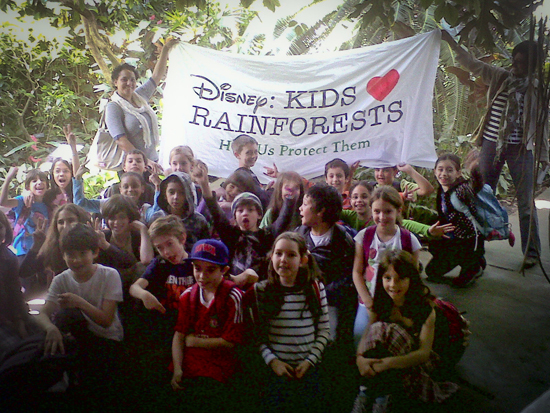UPDATE: On October 11, 2012, Disney announced a comprehensive paper policy that maximizes its use of environmentally superior papers like recycled and eliminates controversial sources like those connected to Indonesian rainforest destruction. For more info, visit www.ran.org/disney.
Young or old, when one thinks of the Walt Disney Company, the first images that come to mind are almost certainly of a favorite animated character from our childhood. From Mickey Mouse, Donald Duck and Bambi to The Jungle Book and The Lion King, Disney specializes in bringing animals to life and imbuing them with personalities that pull on human heartstrings and ignite children’s imaginations.
Unfortunately, like any classic Disney tale, there is a darker side to this story, one that Disney does not want you to hear. Disney’s paper buying practices are driving some of Earth’s most iconic animals towards extinction, and so far the company is doing nothing about it.
Disney is the largest publisher of children’s books in the world, producing over 50 million books and 30 million magazines a year in the US alone. Last year, Rainforest Action Network (RAN) hired an independent lab to conduct tests on the fiber found in children’s books published by the top ten US publishers. Nine of the ten tested positive for fiber linked to Indonesian rainforest destruction, Disney included. See Turning the Page on Rainforest Destruction: Children’s Books and the future of Indonesia’s rainforests.
RAN approached each of the companies before releasing the incriminating data to allow each a chance to address this serious problem. In the year that followed, RAN worked closely with these companies and eight of the original ten have now established commitments not to source their paper from controversial Indonesian fiber. Seven of the ten have agreed to specifically avoid purchasing from the notoriously destructive logging and paper companies APP (Asia Pulp and Paper) and APRIL (Asia Pacific Resources International Limited) altogether.
Sadly, Disney has lagged behind its peers and to date has offered only empty words that do nothing to ensure the company is not still purchasing paper driving rainforest destruction.
Indonesia is a real life Magic Kingdom, home to some of the most biologically and culturally diverse forest ecosystems on Earth. With only 1% of the planet’s land area, Indonesia’s rainforests are home to 16% of all bird species, 11% of all plants and 10% of all mammals. This wealth of life includes endangered tigers, orangutans and elephants, the real life characters featured in Disney’s Jungle Book.
Reckless logging, largely driven by demand for cheap paper products and palm oil, has threatened all of this by causing one of the world’s highest rates of deforestation. The carbon emissions from this large scale deforestation has made Indonesia the world’s 3rd largest greenhouse gas polluting country, behind only the US and China.
Indonesia’s forest products industry is internationally renowned for its corruption and high rates of illegal logging, as well as for its devastating impacts on biodiversity, forest communities and the climate. The vast majority of Indonesia’s pulp and paper — approximately 80% — is controlled by two large and controversial suppliers: APP and APRIL. Over the past decade both have become infamous for their widespread, rapacious demolition of Indonesia’s rainforests and communities.
It’s time for Disney to realize that rainforest destruction is no fairy tale. Rainforest Action Network is putting Disney on notice, and we hope you will join us to get the company to align its practices with the values it espouses and embeds in the stories it tells. Bulldozers and chainsaws have no place in the habitat of endangered species or in the production of storybooks for children. It’s time for Disney to stop doing business with nefarious bad actors like APP and APRIL and to adopt a comprehensive policy that can guarantee parents that reading bedtime stories to their kids will not make them unwitting participants in tiger and orangutan extinction.
Because in the end, it was Disney who helped many of us learn for the first time, it’s a small world, after all.
